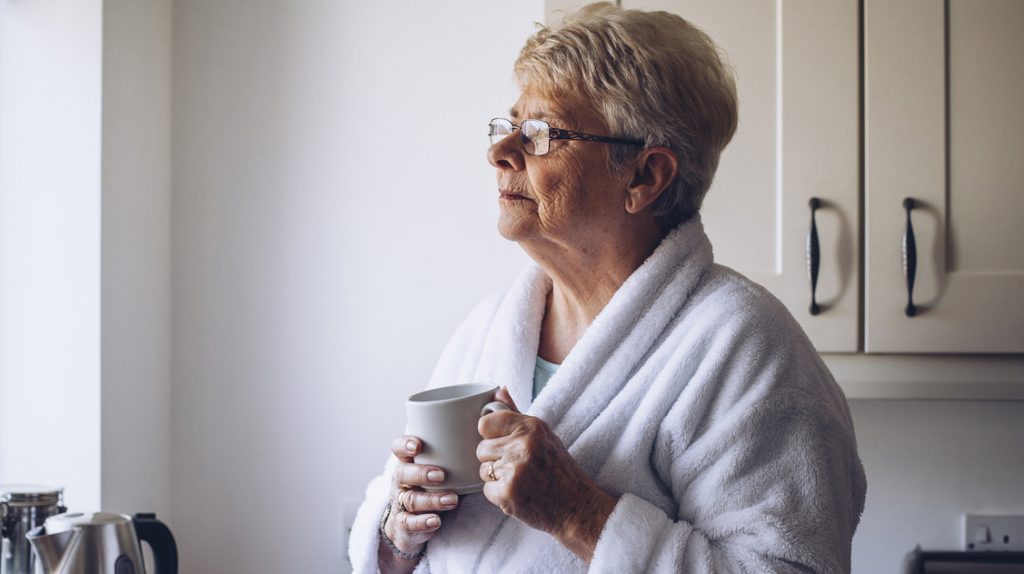For many older people, loneliness and isolation will be a big issue during the Coronavirus lockdown. In this blog, our Research and Policy Manager, Dr Kellie Payne, looks at how to spot feelings and symptoms of loneliness, and what can be done about them.
Loneliness and isolation are separate things
There has been a lot of focus on the impact social isolation during COVID-19 will have on people around the world. During this time the majority of people are being asked to self isolate at home.
For many older people, this will mean an extended period at home on their own without any face to face social contact. This could exacerbate the feelings of loneliness many will have been experiencing before self-isolation.
However, with some effort and attention you can find new ways of staying connected. It is heartening to note as well the outpouring of community support that has emerged during this crisis, and there’s no better time to find new ways to become connected to your neighbours.

It is key to remember however, that social isolation and loneliness are two separate things. Just because you might be socially distancing, it does not automatically follow that you will be feeling lonely.
Loneliness is the unpleasant feeling you get when the contact you have is not the contact you desire. So in these extraordinary circumstances it may be such that you can alter your expectations about the amount of social contact you will be having and you can adjust to that expectation.
Keeping connected
However, if you do feel like you are missing out on human connection there are ways you can compensate for the lack of social interaction, in particular you can take your existing relationships online and communicate via your computer or the phone.
We’ve produced some tips for how you can stay connected in isolation.
While there is something to be said about face to face contact a lot of the feelings of connectedness can continue to flourish if you nurture those relationships virtually. Part of feeling connected is feeling understood and appreciated, and opening up about how you are feeling with others will help you to connect.
What to look out for
If you are feeling lonely some of the physiological changes you might want to look out for are difficulty sleeping, and hypervigilance: feeling on high alert for possible threats and having more tension and stress in your body.
If you are experiencing any of these feelings, it is particularly important to look after yourself and reach out to your friends and family and seek out connection in this time.
For many chronically lonely people these support networks that are so important in times of crisis. It has been heartening to see the level of community response to the crisis and a big part of this has been neighbours checking in on neighbours and part of the volunteer ask for the NHS has been for volunteers to call those most vulnerable.
Encouraging people to try to maintain existing connections and find ways to build new ones in this time is crucial. Look out for any new ways to connect with your neighbours or others in your community who wish to help.
The impact on our health
It is also important to remember that the health effects of loneliness are measured over a long period of time. While we don’t know the exact mechanisms that influence the negative health impacts (such as risk of stroke, heart disease or increased risk of early mortality) it is not likely that a short period of loneliness will have a serious impact on our health.
It will impact our health in some ways, but the long term effects we warn of are more over longer periods of time. But the raised cortisol levels that result from loneliness will have some impact on our health in the short term, and these will impact our bodies in the stress levels we experience and have an impact on our sleep.
Older people are also likely to be experiencing extra stress around the emphasis in the media around the severity of risk COVID-19 for those over 70. For many of us this will be a worrying and challenging time. It’s important to know that this isolation is temporary, and that there are ways of staying connected with friends, neighbours and family.
If you are struggling with feelings of loneliness, here are some things that will help:
- Having a structure to the day and starting the day with something ‘to get you going’ – getting up/going to bed at a similar time each day
- Thinking in the short-term (today, this week, this month) rather than the longer-term
- Strategies for staying in the moment include mindfulness and breathing techniques
- Reminding yourself to try and focus on the positive – what do you have that’s important to you and that you want to keep doing?
- Planning something every day to look forward to (eg phone call, watching a film, meal prep),
- Stepping out into the garden if you have one or finding a window with a view to take in the ‘outside world’ and appreciate the nature around you
- Talking about your worries – the stigma of loneliness may be reduced at the moment given the extreme circumstances and it may be easier for people to talk about how they’re feeling. people need reassurance. People with pre-existing mental health problems will be at particular risk
- Activities within the home that distract you – keep ‘doing something’
- Activities with more ‘purpose’ – reading, any interests you have




No comments on this article yet. Please feel free to submit a comment below.
By submitting a comment you grant Campaign to End Loneliness a perpetual license to reproduce your words and name/web site in attribution. Inappropriate and irrelevant comments will be removed at an admin's discretion. Your email is used for verification purposes only, it will never be shared.